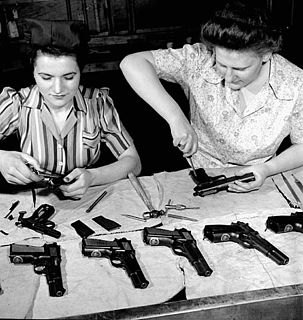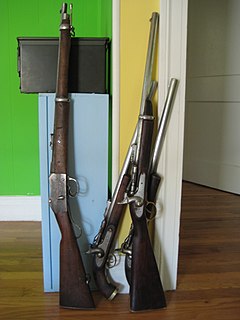 W
WThe arms industry, also known as the arms trade, is a global industry which manufactures and sells weapons and military technology, and is a major component of the military–industrial complex. It consists of a commercial industry involved in the research and development, engineering, production, and servicing of military material, equipment, and facilities. Arms-producing companies, also referred to as arms dealers, or as the military industry, produce arms for the armed forces of states and for civilians. Departments of government also operate in the arms industry, buying and selling weapons, munitions and other military items. An arsenal is a place where arms and ammunition - whether privately or publicly owned - are made, maintained and repaired, stored, or issued, in any combination. Products of the arms industry include guns, artillery, ammunition, missiles, military aircraft, military vehicles, ships, electronic systems, night-vision devices, holographic weapon sights, laser rangefinders, laser sights, hand grenades, landmines and more. The arms industry also provides other logistical and operational support.
 W
WAction Target is a manufacturer of custom shooting ranges and portable steel targets for military, law enforcement, Special Forces groups, tactical training schools, and commercial applications based in Provo, Utah. Since its founding in 1985, Action Target has increased its inventory to include over 4,000 products. The company designs, delivers, and installs indoor and outdoor range equipment throughout the world.
 W
WASFAT Inc., is a Turkish state-owned defense contractor. The company under the jurisdiction of the Turkish Ministry of National Defense, which develop, manage and utilise the facilities and capabilities of the 27 ordnance factories and 3 public naval shipyards in Turkey that were previously led by the country’s Ministry of National Defense, to provide innovative products and solutions covering design, manufacture, maintenance, sustainment and training areas for global defence market.
 W
WThe military–industrial complex (MIC) describes the relationship between a nation's military and the defense industry that supplies it, seen together as a vested interest which influences public policy. A driving factor behind this relationship between the government and defense-minded corporations is that both sides benefit—one side from obtaining war weapons, and the other from being paid to supply them. The term is most often used in reference to the system behind the military of the United States, where it is most prevalent due to close links between defense contractors, the Pentagon and politicians and gained popularity after a warning on its detrimental effects in the farewell address of President Dwight D. Eisenhower on January 17, 1961.
 W
WEgypt Defence Expo, or EDEX, is the first international defence exhibition in Egypt, covering air, land and sea military technologies. The exhibition is held every two years at the Egypt International Exhibition Center in the city of New Cairo. The exhibition is organised by Clarion Events Defence and Security, in cooperation with the Egyptian Armed Forces and Ministry of Military Production. EDEX aims to bring together key defence and security players from the region and across the world.
 W
WThe United States Department of Defense is one of the largest single consumers of energy in the world, responsible for 93% of all US government fuel consumption in 2007 (Air Force: 52%; Navy: 33%; Army: 7%. Other DoD: 1%). In FY 2006, the DoD used almost 30,000 gigawatt hours (GWH) of electricity, at a cost of almost $2.2 billion. The DoD's electricity use would supply enough electricity to power more than 2.3 million average American homes. In electricity consumption, if it were a country, the DoD would rank 58th in the world, using slightly less than Denmark and slightly more than Syria (CIA World Factbook, 2006). The Department of Defense uses 4,600,000,000 US gallons (1.7×1010 L) of fuel annually, an average of 12,600,000 US gallons (48,000,000 L) of fuel per day. A large Army division may use about 6,000 US gallons (23,000 L) per day. According to the 2005 CIA World Factbook, if it were a country, the DoD would rank 34th in the world in average daily oil use, coming in just behind Iraq and just ahead of Sweden.
 W
WIndo Defence Expo & Forum is a biannual arms and defence technology sales exhibition as well as promotional event for international defense and security equipment manufacturers, which is held sice 2004 at JIExpo, Jakarta, Indonesia. It is the largest exhibition of its kind in Southeast Asia and world calendar event.
 W
WInstalaza SA is a Spanish firm that designs, develops and manufactures equipment and other military material for infantry. The company, founded in 1943, is headquartered in Zaragoza, Aragon, where its production plant is also located, The company became famous for the production of highly accurate rocket launchers.
 W
WThe International Defence Exhibition & Conference, or IDEX, is a biennial arms and defence technology sales exhibition. The exhibition is the largest defence exhibition and conference in the Middle East and takes place in Abu Dhabi, United Arab Emirates.
 W
WThe Jupiter Factory is an abandoned factory located on the outskirts of Pripyat, in the Chernobyl Exclusion Zone in northern Ukraine. Officially a manufacturer of cassette recorders and components for home appliances, the factory secretly produced semiconductor components for the military, and had test workshops for robotic systems.
 W
WKenya Ordnance Factories Corporation (KOFC) is a state-owned defense corporation, the only ammunition manufacturer in Kenya, which is headquartered in Eldoret–Kitale Road 20 km from Eldoret, Kenya.
 W
WA Khyber Pass copy is a firearm manufactured by cottage gunsmiths in the Khyber Pass region between Pakistan and Afghanistan.
 W
WLuciad is an international supplier of geographic information system (GIS) tools and is recognised as the worldwide leader for high performance geospatial situational awareness. Mainly focusing on the aviation, defense and security markets, Defence customers account for about 70% of its business.
 W
WThe Malaysia Defence Industry Council (MDIC), formed in August, 1999, is tasked with coordinating the orderly development of the Malaysia Defence Industry Sector. It is chaired by the Malaysian Minister of Defence, and involves 56 members from the private sector as well as from the Government. It functions to not only support the local development sector, but to market it to overseas buyers and help companies access foreign markets. It also aims to build relationships with other defence industries.
 W
WThe Military-Industrial Commission of the Russian Federation was established by a presidential decree in March 2006. According to the decree, it is a permanently functioning body with vast responsibilities for supervising the distribution and implementation of the "State defense order". The commission answers directly to the President of Russia. It coordinates between the Defence Ministry of the Russian Federation, the Armed Forces of the Russian Federation, and the defense industry of Russia. Until then, the defense industry was supervised by Russia's Ministry of Industry and Energy, as well as by the previous government consultative body with a similar name.
 W
WThe Ministry of Defence Industry of Azerbaijan is a governmental agency within the Cabinet of Azerbaijan in charge of design, manufacturing, regulation and maintenance of products in the fields of defense, radio electronics, instrument engineering.
 W
WThe National Defense Industrial Association (NDIA) is a trade association for the United States government and defense industrial base. It is an educational 501(c)3 educational organization. Its headquarters are in Arlington, Virginia. NDIA was established in 1919 as a result of the inability of the defense industry to scale up the war effort during World War I.
 W
WThe Shell Crisis of 1915 was a shortage of artillery shells on the front lines in the First World War that led to a political crisis in the United Kingdom. Previous military experience led an over-reliance on shrapnel to attack infantry in the open, which was negated by the resort to trench warfare, for which high-explosive shells were better suited. At the start of the war there was a revolution in doctrine: instead of the idea that artillery was a useful support for infantry attacks, the new doctrine held that heavy guns alone would control the battlefield. Because of the stable lines on the Western Front, it was easy to build railway lines that delivered all the shells the factories could produce. The "shell scandal" emerged in 1915 because the high rate of fire over a long period was not anticipated and the stock of shells became depleted. The inciting incident was the disastrous Battle of Aubers, which reportedly had been stymied by a lack of shells.
 W
WThe War Industries Commission was a body set up by the Generalitat de Catalunya on August 7, 1936 with the aim of organizing and coordinating the efforts of all production facilities to supply armaments to the republican forces during the Spanish Civil War. After reducing its powers in the wake of the May Days, the Commission remained operational in Catalonia until August 11, 1938, when it was completely taken over by the republican government.